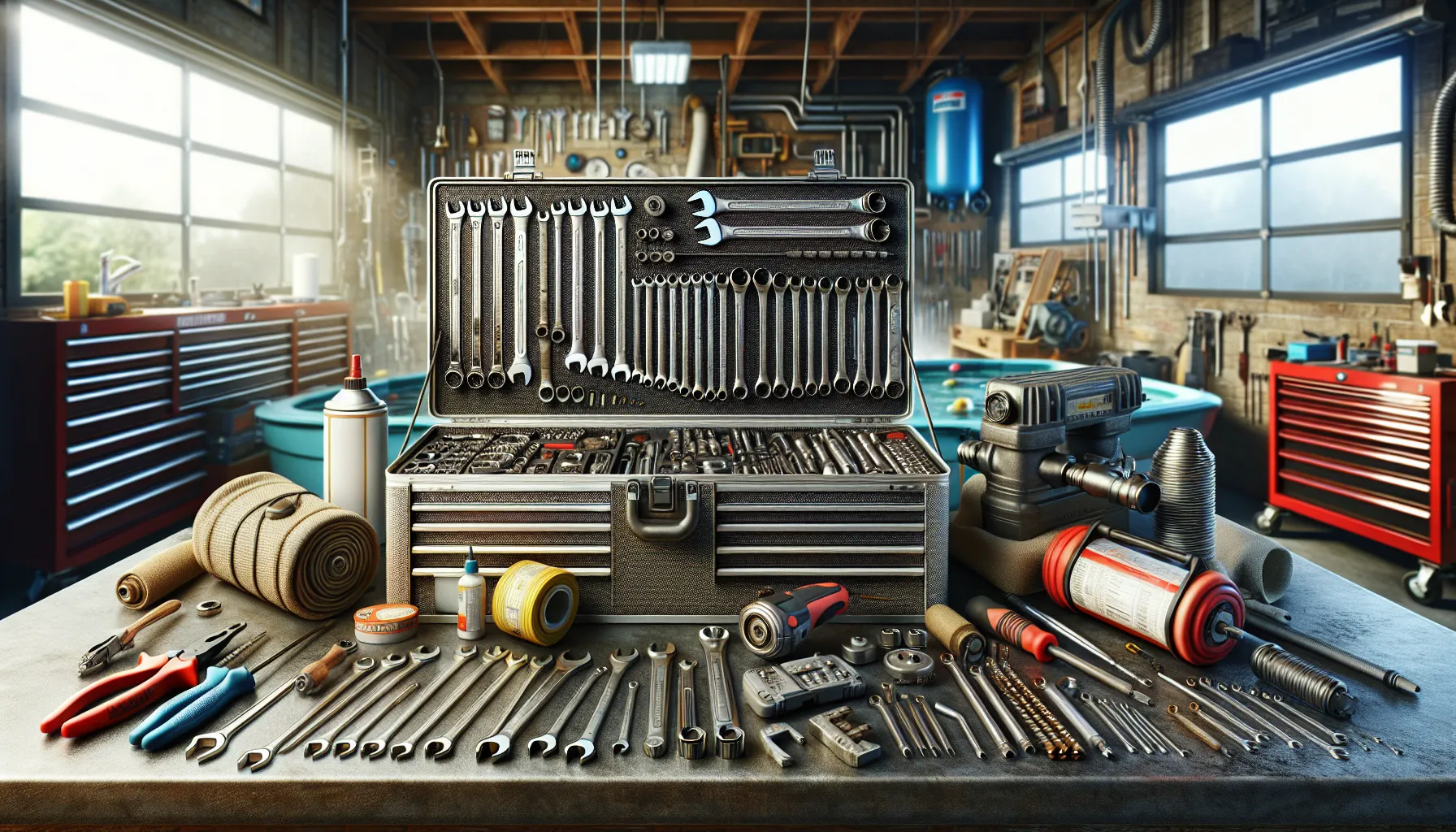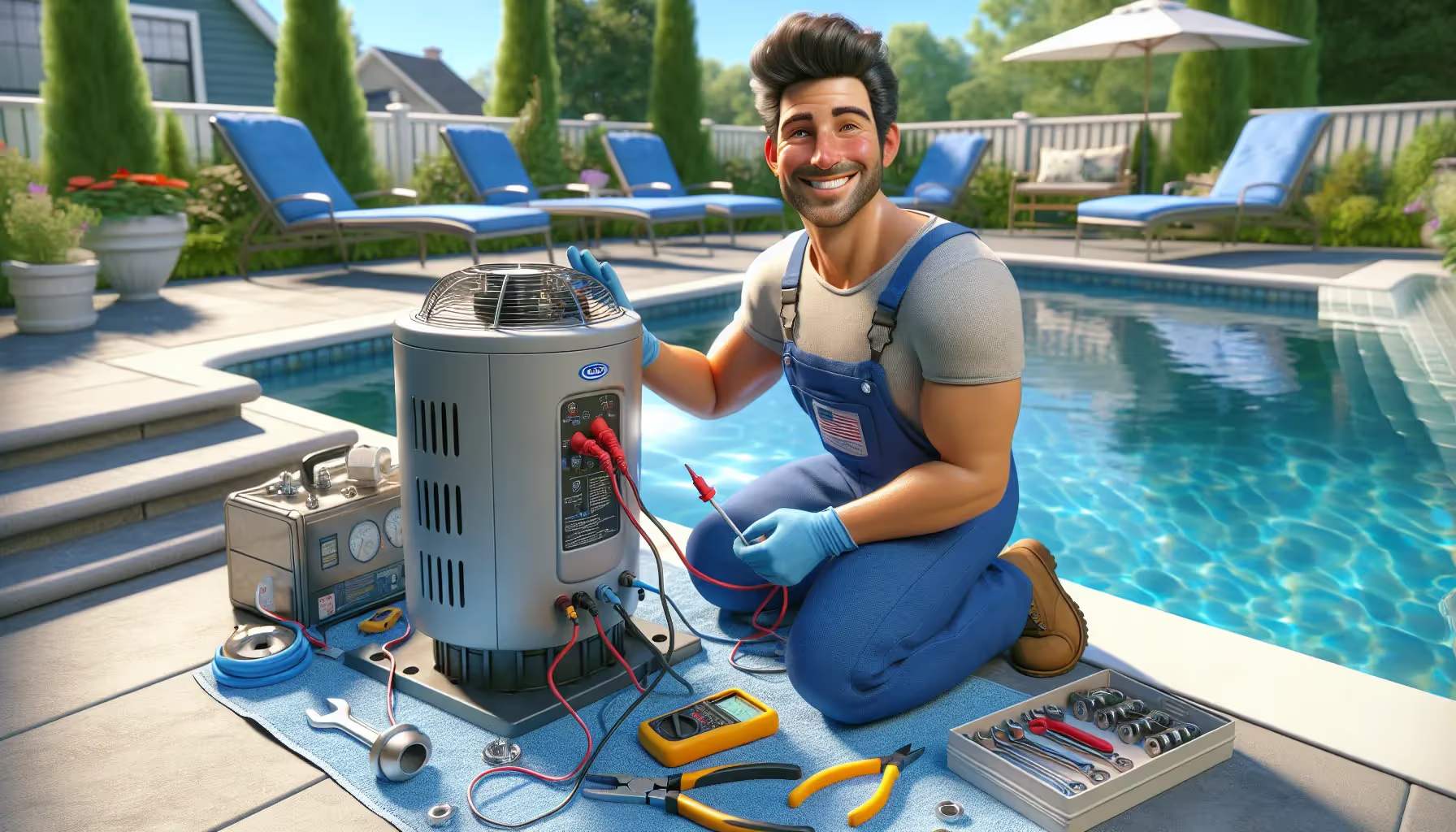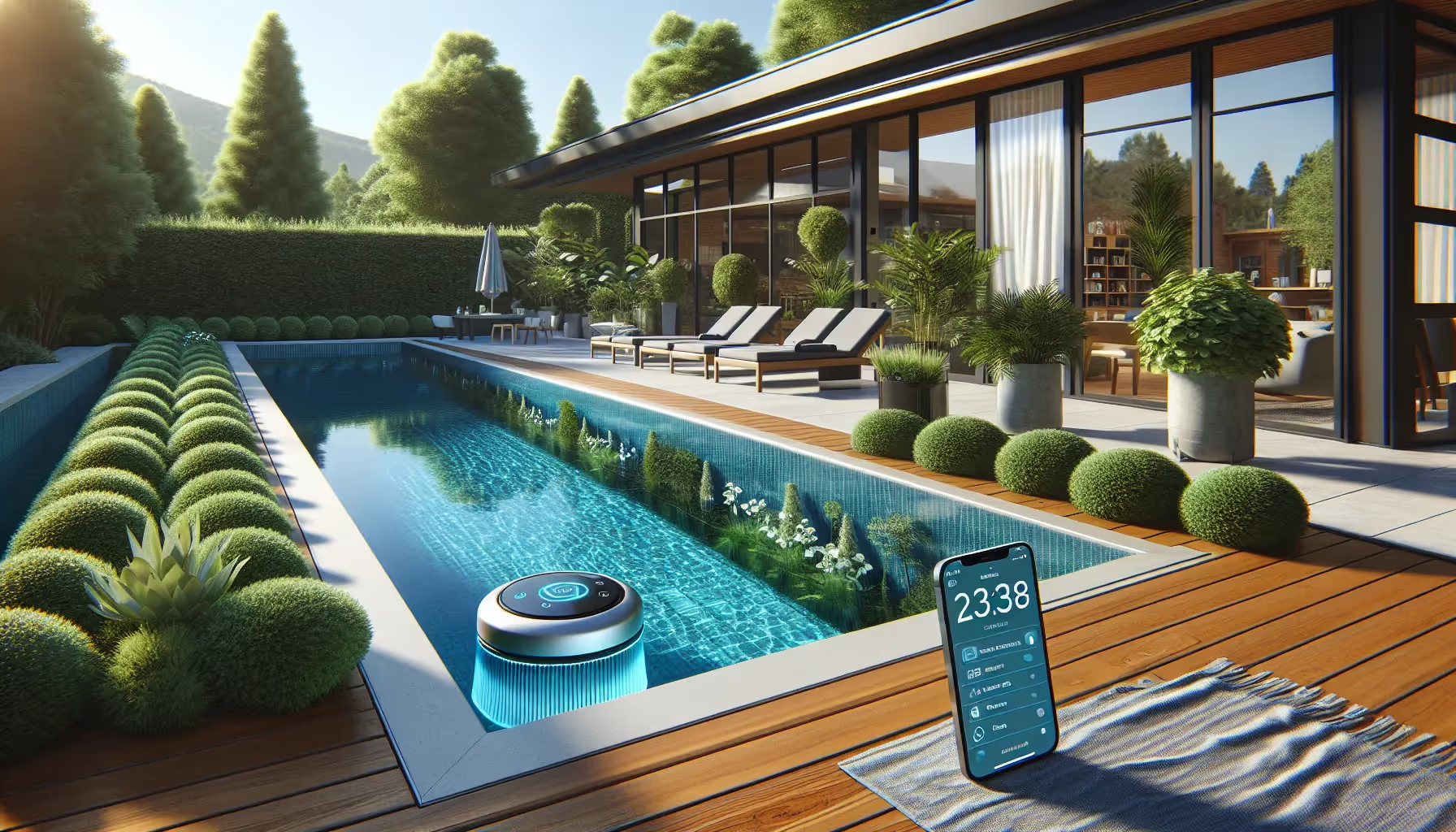Key Takeaways
- Vital Role of Pool Heaters: A well-maintained pool heater is essential for enjoyable swimming experiences, with improper maintenance causing nearly 30% of heater issues.
- Common Problems: Recognizing symptoms like inconsistent heating, unusual noises, and increased energy bills helps in timely troubleshooting, addressing issues like electrical faults and clogged filters.
- Essential Diagnostic Tools: Utilizing tools such as pressure gauges and digital multimeters empowers pool owners to accurately diagnose gas supply and electrical problems in their heaters.
- Repair Tools: Wrenches, socket sets, and soldering tools facilitate efficient repairs, allowing quick access to internal components and reliable electrical connections.
- Maintenance Tools: Regular cleaning with appropriate equipment, and having replacement parts on hand, significantly enhances the longevity and efficiency of pool heaters.
- Proactive Care: Staying proactive with maintenance and repairs leads to reduced costs and improved functionality, ensuring a consistently enjoyable swimming experience.
As pool owners, we know how crucial a well-functioning pool heater is for enjoying those warm summer swims. Did you know that nearly 30% of pool heater issues stem from improper maintenance or troubleshooting? By learning which tools are most effective for diagnosing and repairing these common problems, we can save time and money while keeping our pools in top shape.
In this article, we'll explore the essential tools every pool owner should have in their arsenal. From simple multimeters to specialized pressure gauges, each tool plays a vital role in ensuring our pool heaters operate efficiently. Let’s dive in and discover how we can tackle those pesky heater issues with confidence.
Understanding Pool Heater Problems
Pool heaters, like any home appliance, can run into issues that disrupt our summer fun. Familiarizing ourselves with common problems helps us troubleshoot effectively and keep our pools enjoyable.
Common Issues Affecting Pool Heaters
Faulty pool heaters often stem from several common issues. These include:
- Electrical Problems: It’s important to check connections and wiring, as loose connections can lead to heater failure.
- Thermostat Failures: A malfunctioning thermostat can cause the heater to misread temperatures, resulting in inadequate heating.
- Clogged Filters: Clogged or dirty filters restrict water flow and heat exchange, causing the heater to perform poorly.
- Gas Supply Issues: For gas heaters, interruptions in gas supply can halt operational efficiency.
- Leaking Components: Leaks in the heater's components can lead to water loss and reduced efficiency.
Identifying these problems quickly can save us time and money on repairs. Using tools like multimeters can help us diagnose electrical issues, while pressure gauges assist in checking gas supply.
Symptoms to Watch For
We should keep an eye out for these symptoms indicating potential heater troubles:
- Inconsistent Heating: If the water temperature fluctuates unexpectedly, it suggests thermostat or heating element issues.
- Unusual Noises: Strange sounds during operation often point to mechanical failures or air trapped in the system.
- Increased Energy Bills: A sudden rise in energy costs can signal inefficiencies due to clogs or leaks.
- Water Discoloration: Discolored water indicates that the heater may need maintenance or cleaning.
- Frequent Shut-Offs: If the heater turns off unexpectedly, it could indicate issues with the electrical system.
Awareness of these symptoms helps address problems before they escalate. Being proactive is key to maintaining a reliable pool heater, keeping our swimming experience enjoyable and worry-free.
Essential Tools for Diagnosis

Diagnosing pool heater issues requires the right tools. Each tool plays a vital role in identifying problems quickly and effectively.
Pressure Gauges
Pressure gauges are crucial for checking gas or liquid propane pressures in gas heaters. Low pressure often leads to heater shutdowns. For instance, if our heater struggles to ignite, a pressure gauge helps confirm whether gas flow is adequate. Regular checks can prevent unnecessary shutdowns during key moments, such as warm pool gatherings. Maintaining proper pressure not only guarantees smoother operation but also promotes safety—who wants a gas leak ruining their swim day?
Digital Multimeters
Digital multimeters find their importance in diagnosing electrical problems. They measure voltage and resistance, two key indicators of a heater’s health. For example, if the heater doesn’t turn on, using a multimeter to check voltage can pinpoint faulty wiring or connection issues. This tool is like a medical check-up for your heater; it can locate problems before they escalate. Knowing how to use a digital multimeter can save us from relying solely on guesswork or costly repairs. It’s a smart move for any pool owner looking to maintain efficiency and avoid unexpected bills.
Tools for Repairing Pool Heaters

When tackling pool heater problems, having the right tools on hand makes a significant difference. Various devices can simplify repairs and diagnostics, enhancing our efficiency.
Wrenches and Socket Sets
Wrenches and socket sets play a pivotal role in pool heater repairs. These tools allow us to easily loosen or tighten fittings and connections. Whether we’re accessing internal parts or adjusting components, having a quality set ensures prompt work. Investing in a complete set means we’re prepared for various sizes and types of bolts. Plus, they won't roll away when we’re focused on repairing—a common annoyance! Consider keeping an organized toolbox to simplify our workflow.
Soldering Tools
Soldering tools are essential for maintaining electrical connections. Sometimes, heating elements require repair or replacement, making soldering a valuable skill. Using these tools allows us to make efficient fixes on-site. It may seem intimidating, but a little practice goes a long way. Funny enough, one of us once soldered a connection with a little too much enthusiasm and ended up with a mini art piece instead—at least our heater was functional afterward! Investing time in mastering this tool can greatly benefit our DIY approach to pool maintenance.
These tools form the backbone of effective repairs, helping us tackle common heater issues like pros.
Maintenance Tools for Longevity

We know that maintaining a pool heater isn’t just a chore; it's vital for enjoying those sunny days in crystal-clear water. The right tools make all the difference in keeping our pool heaters running smoothly.
Cleaning Equipment
Cleaning equipment plays a crucial role in heater longevity. A good cleaning brush helps remove debris from the heater elements and surrounding areas, which allows for better heat exchange. Regular cleaning prevents buildup that can cause major issues down the line. Filter inspection kits are also essential. These kits let us inspect and clean pool filters, ensuring proper water flow. With clean filters, our heaters run efficiently, saving us money on energy bills.
Imagine the relief of not dealing with an underperforming heater during a pool party. No one wants to explain why the water feels like ice. We all want that glorious, warm splash as we jump in! How often do we set aside time to keep everything tidy and in check, from our pool filter to our heater?
Replacement Parts
Sometimes, repairs need more than just a good cleaning. Having the right Replacement Parts on hand can save us from stressful situations. Heater elements need replacement over time. They’re the heart of our heater, so when they fail, we feel it. Obtaining thermostat and control units allows us to upgrade our systems, making sure they're working optimally.
Don't forget about valves and fittings. These little pieces are crucial for proper water flow. When we can replace them quickly, we avoid prolonged downtime and keep the good times rolling.
Conclusion
By equipping ourselves with the right tools and knowledge we can tackle common pool heater problems effectively. Understanding how to diagnose issues with pressure gauges and multimeters empowers us to address electrical and gas-related concerns with confidence.
Investing in quality repair tools like wrenches and soldering kits ensures we can maintain our heaters efficiently. Regular maintenance and having essential replacement parts on hand not only prolong the life of our pool heaters but also enhance our overall swimming experience.
With these strategies in place we can enjoy our pools without the worry of unexpected heater failures. Let's keep our pools warm and inviting all summer long.
Frequently Asked Questions
What are common pool heater problems?
Common pool heater problems include electrical issues, thermostat failures, clogged filters, gas supply interruptions, and leaking components. Symptoms may involve inconsistent heating, unusual noises, increased energy bills, water discoloration, and frequent shut-offs.
How can I diagnose pool heater issues?
Diagnosing pool heater issues can be done using essential tools like digital multimeters for electrical problems and pressure gauges for checking gas or liquid propane pressures. These tools help identify faulty wiring, connection issues, or low pressure that could lead to shutdowns.
What tools do I need for pool heater maintenance?
Essential tools for pool heater maintenance include pressure gauges, digital multimeters, wrenches, socket sets, and soldering tools. Having these tools allows you to troubleshoot and repair common issues effectively, ensuring your pool heater functions efficiently.
How can I prevent pool heater problems?
Preventing pool heater problems involves regular maintenance checks, such as cleaning filters, inspecting electrical connections, and monitoring gas pressure. Keeping essential repair parts like heater elements and control units on hand can also minimize downtime.
Why is proper maintenance important for pool heaters?
Proper maintenance is crucial for pool heaters to ensure longevity and efficient operation. Regular cleaning and preventive measures can avoid issues caused by debris buildup or faulty components, allowing for enjoyable swimming experiences without interruptions.






